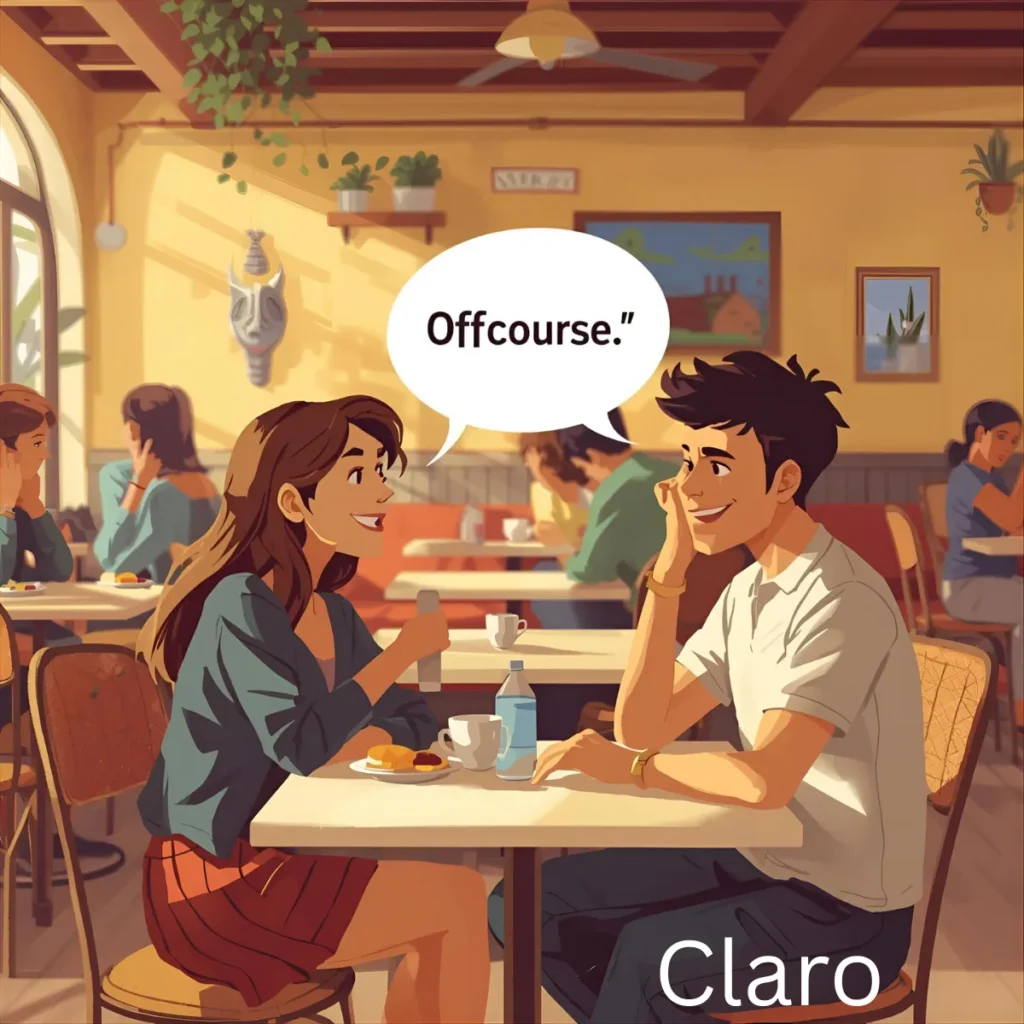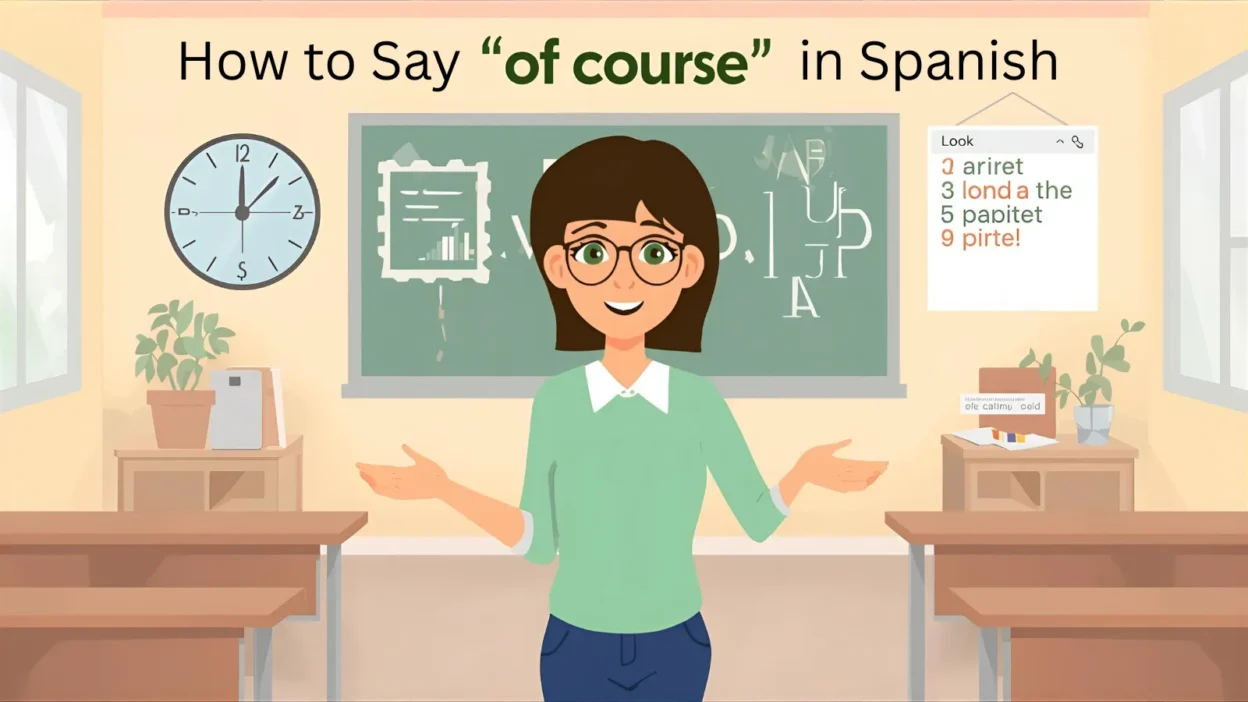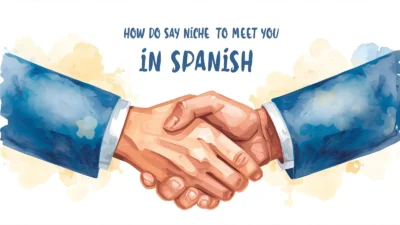If you’re learning Spanish, knowing how to say Of Course in Spanish is very useful. You can use it to agree with someone, show confidence, or respond positively in conversations. The phrase is simple, easy to remember, and works in both formal and casual situations. In this guide, you’ll learn the correct Spanish expressions, how to pronounce them, and how to use them naturally in real life.
By knowing different variations, you can adapt to both casual and formal situations while speaking Spanish.
Say Of Course in Spanish
These expressions also show respect and friendliness when interacting with native speakers. Mastering them will make your Spanish communication smoother and more effective.
15 Ways to Say Of Course in Spanish
| No. | Spanish Phrase | English Meaning |
|---|---|---|
| 1 | Por supuesto | Of course |
| 2 | Claro | Of course / Sure |
| 3 | Desde luego | Of course / Certainly |
| 4 | Claro que sí | Of course / Of course yes |
| 5 | Cómo no | Of course / Why not |
| 6 | Naturalmente | Naturally / Of course |
| 7 | Sin duda | Without a doubt |
| 8 | Por descontado | Of course / Certainly |
| 9 | Evidentemente | Obviously / Of course |
| 10 | Seguro | Sure / Of course |
| 11 | Obvio | Obvious / Of course |
| 12 | Indudablemente | Undoubtedly / Of course |
| 13 | Ya lo creo | Of course / You bet |
| 14 | Ni lo dudes | Don’t doubt it / Of course |
| 15 | Faltaba más | Of course / No problem at all |
1. Por supuesto – “Of course” (standard)
Origin:
This is the most direct translation and widely accepted across all Spanish-speaking countries.
Example:
👤 A: ¿Puedes ayudarme con mi tarea?
👤 B: ¡Por supuesto!
Use: Formal or informal; universally understood and safe to use in any context.
2. Claro – “Sure” / “Of course”

Origin:
Literally means “clear.” It’s used to express clear agreement and is very common in everyday Spanish.
Example:
👤 A: ¿Vienes a la fiesta esta noche?
👤 B: ¡Claro!
Use: Informal and friendly. Very common in Spain and Latin America.
3. Claro que sí – “Of course, yes!”
Origin:
An emphasized version of claro, adding a confident “yes.”
Example:
👤 A: ¿Te gustaría ir al cine conmigo?
👤 B: ¡Claro que sí!
Use: Cheerful and enthusiastic affirmation.
4. Desde luego – “Of course” / “Certainly”

Origin:
Literally “from then” or “indeed.” It’s more common in Spain and slightly more formal.
Example:
👤 A: ¿Está permitido sacar fotos aquí?
👤 B: Desde luego.
Use: Neutral to formal; used in both spoken and written Spanish.
5. Cómo no – “Why not?” / “Of course”
Origin:
Literally “How not?”—used to affirm that there’s no reason to refuse.
Example:
👤 A: ¿Me prestas tu libro un momento?
👤 B: ¡Cómo no!
Use: Polite and slightly old-fashioned; often heard in Latin America.
6. Por supuesto que sí – “Of course I do/yes!”

Origin:
An extended and more emphatic version of por supuesto.
Example:
👤 A: ¿Tienes tiempo para hablar ahora?
👤 B: ¡Por supuesto que sí!
Use: Formal or emotional tone to strongly affirm.
7. Claro que no – “Of course not”
Origin:
Used to strongly deny or reject something.
Example:
👤 A: ¿Estás enojado conmigo?
👤 B: ¡Claro que no!
Use: Emphatic and clear rejection.
8. Naturalmente – “Naturally” / “Of course”
Origin:
From Latin naturaliter. Used in formal or educated Spanish.
Example:
👤 A: ¿Leíste el informe?
👤 B: Naturalmente, era mi responsabilidad.
Use: Formal and intellectual tone.
9. Sí, cómo no – “Yes, of course”
Origin:
Used mostly in Latin America, this is a polite double-affirmation.
Example:
👤 A: ¿Me puede traer otra servilleta?
👤 B: Sí, cómo no.
Use: Very polite, commonly used by service workers.
10. Con gusto – “With pleasure” / “Of course”
Origin:
Literally “with pleasure,” this adds warmth and politeness to the agreement.
Example:
👤 A: ¿Podrías explicarlo otra vez?
👤 B: Con gusto.
Use: Courteous, often used in customer service or formal settings.
11. Obvio – “Obviously” / “Of course”
Origin:
Borrowed from the Latin obvius. Used among younger speakers to indicate that something is obvious.
Example:
👤 A: ¿Ya viste el nuevo episodio?
👤 B: ¡Obvio!
Use: Informal, often used by teens or in casual speech.
12. Ni lo dudes – “Don’t even doubt it” / “Of course”
Origin:
Literally “Don’t even doubt it,” this is a strong and affectionate way to say yes.
Example:
👤 A: ¿Cuentas conmigo para el proyecto?
👤 B: ¡Ni lo dudes!
Use: Emphatic and informal; often used among close friends.
13. Faltaba más – “Of course” / “No need to thank me”
Origin:
An idiomatic phrase often used in Spain, meaning “It’s the least I can do.”
Example:
👤 A: Gracias por tu ayuda.
👤 B: ¡Faltaba más!
Use: Formal and gracious; expresses willingness without obligation.
14. Para eso estamos – “That’s what we’re here for”
Origin:
Common in Latin America, this phrase implies that helping is expected.
Example:
👤 A: Gracias por explicarme eso.
👤 B: Para eso estamos.
Use: Friendly and modest; used to reassure someone.
15. Cuenta conmigo – “Count on me” / “Of course”
Origin:
Used to promise support, not just agree. Implies commitment.
Example:
👤 A: ¿Puedo pedirte un favor mañana?
👤 B: ¡Cuenta conmigo!
Use: Strong, personal; used among friends or family.
FAQs
- What is the most common way to say “Of Course” in Spanish?
The most common phrase is “Por supuesto.” - How do you pronounce “Por supuesto”?
It’s pronounced por soo-PWEH-sto. - Can I use “Por supuesto” in casual conversations?
Yes, it works perfectly in both casual and formal situations. - Is there another way to say “Of course” in Spanish?
Yes, you can also say “Claro” which is shorter and more informal. - How do you respond to a favor with “Of course” in Spanish?
You can say “Por supuesto” or “Claro que sí” meaning Of course! - Can “Claro” be used with friends?
Yes, it’s very common among friends or family. - How do you say “Of course not” in Spanish?
Say “Por supuesto que no” to politely refuse. - Is “Por supuesto” used in all Spanish-speaking countries?
Yes, it is widely understood everywhere. - Can I use “Por supuesto” in writing?
Yes, it works well in emails, messages, or letters. - How do you say “Of course I can help” in Spanish?
Say “Por supuesto que puedo ayudarte.”
Conclusion:
Understanding how to say Of Course in Spanish gives you the ability to agree politely and confidently in any context. From casual chats to formal settings, these phrases show assurance and make your communication more natural. Using them regularly will help you connect better with Spanish speakers and build smoother conversations.



